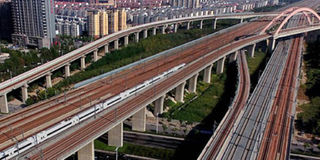The coming China shock

A train runs in Zhengzhou, capital of Central China’s Henan Province in 2016. NET PHOTO
In September 2018, we argued that China’s economic and foreign policies were defying the “laws” of economics and geopolitics, and warned that the situation could not last. Since then, our assessment has been borne out, and our concerns have deepened.
Until recently, China had been able to pursue a unique development path, owing to the government’s far-reaching control over the economy (and society more generally). But those days are over.
The country’s internal debts are mounting to unsustainable heights, and domestic investment levels have passed the point of diminishing returns and are veering toward negative territory.
Moreover, China’s strategy of fostering exports, promoting industrial “national champions,” and expropriating foreign technology has crossed the threshold of what the West, especially the United States, is willing to tolerate.
Chinese President Xi Jinping’s Belt and Road Initiative (BRI) is showing all the signs of imperial overreach. Not only does the BRI’s lending far exceed participating governments’ borrowing capacity, but its loan terms have become increasingly onerous – indeed, usurious – as Harvard University’s Ricardo Hausmann recently observed.
Back in September, we saw some discontinuity in China’s economic performance as inevitable. Even if the country was not heading for a full-blown crisis, we believed it would almost certainly experience some combination of rapidly decelerating growth and a sharply depreciating exchange rate.
That prognosis has since become even more likely. With global economic growth and exports declining, China’s economy is on track to slow further relative to the 6.4 per cent growth recorded in the fourth quarter of 2018.
The double-digit average achieved from the 1980s until recently has never seemed more distant.
In response to the current global slowdown, the Chinese government has decided to loosen restrictions on private and public borrowing.
But this will merely aggravate the country’s debt and overinvestment problems. Or, as a famous Chinese saying goes, it is akin to “drinking poison to quench one’s thirst.”
Even without these macro developments, China’s defiance of well-established findings in development economics was never going to last forever.
The economists Douglass North, Daron Acemoglu, and James A. Robinson have shown that long-run economic development tends to rely on strong state institutions and open political systems, because these are necessary to foster competition, investor confidence, dynamism, and innovation.




